Shedding Light on The Challenges Marketing Teams Face On Their Net Zero Journey
Download the report here!
Download the report here!
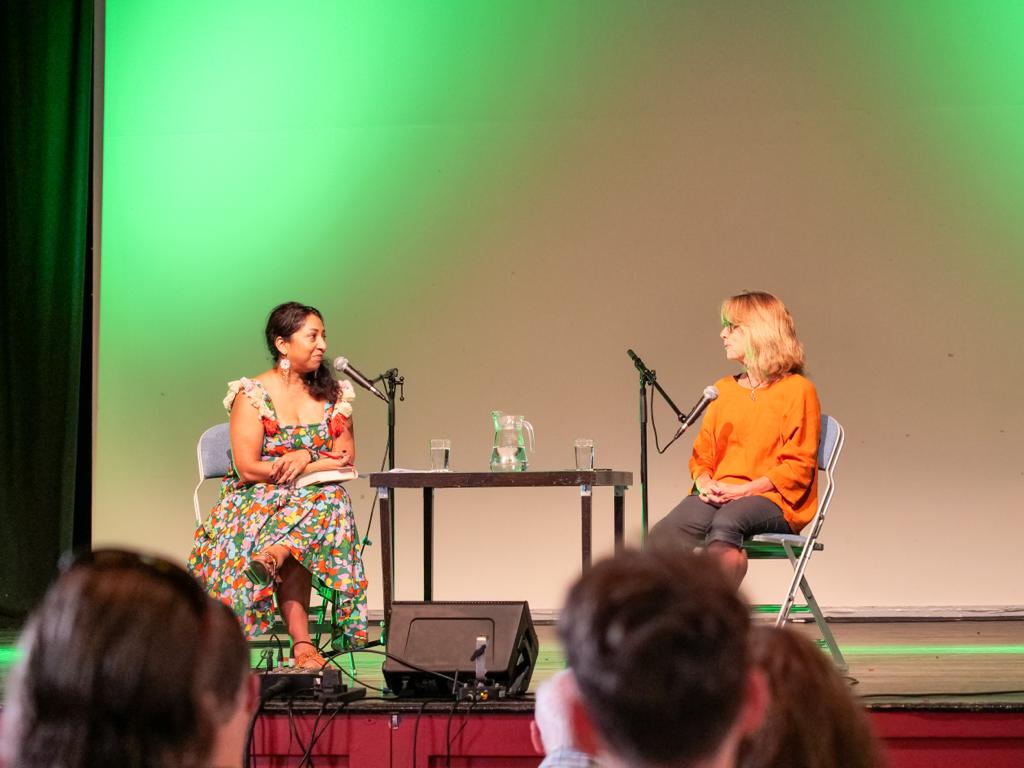
I was invited to interview author Kate Rawles about her book, The Life Cycle – 8,000 Miles In The Andes By Bamboo Bike for the Thames Ditton Nature and Climate Festival that ran from 8-10 September, and what a conversation we had! Kate shared with us the devastation that she witnessed as she rode her bike, called Woody through this great landscape. The Andes is among the world’s longest mountain ranges, with a varied terrain that encompasses glaciers, volcanoes, grassland, desert, lakes, and forest. The mountains shelter pre-Columbian archaeological sites and wildlife including chinchillas and condors. From Venezuela in the north, the range passes through Colombia, Ecuador, Peru, Bolivia, Argentina, and Chile.
Kate is a fabulous storyteller and had us enthralled with her honest account of what she saw and experienced, threaded with some lighter moments of humour, leaving us with a message of hope…that we can make the change needed by our planet as a community.
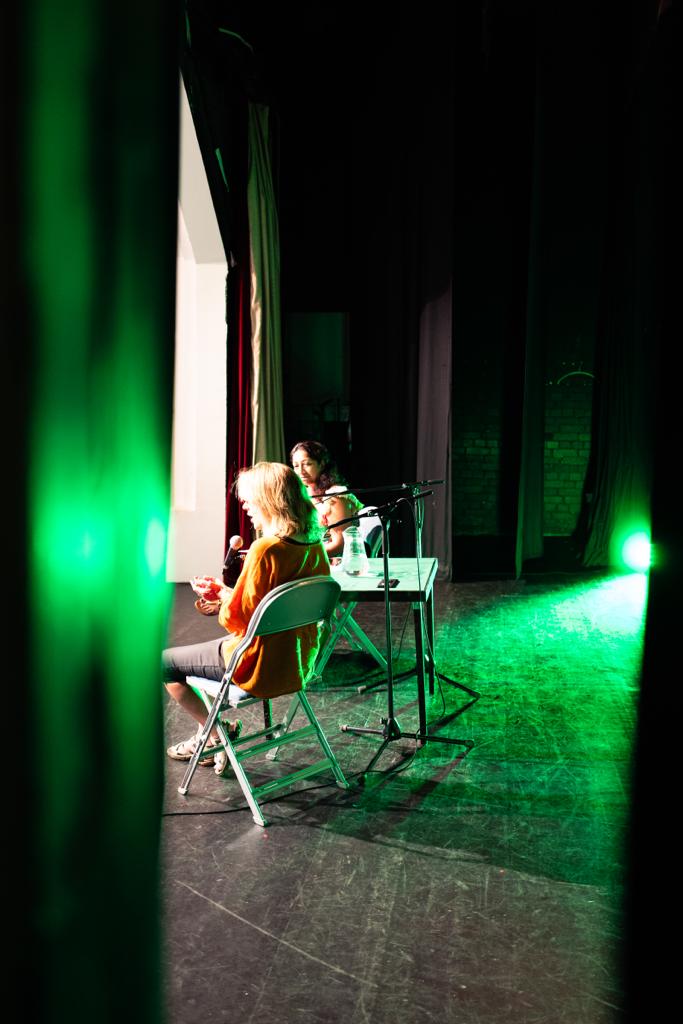
Christiana Figueres, former head of the UN Framework Convention on Climate Change has said about this book, “A heart-wrenching and heart-warming ride through South America and into the punding soul of the vibrant biodiversity we have ignored for way too long.”
Did you watch this brilliant and honest conversation with Ingmar Rentzhog CEO and Co-Founder of We Don’t Have Time about the climate crisis? Well don’t worry, you can watch it here. This video since its release on 7 September has had 947K views alone on Twitter also known as X.
And yes the cat is out of the bag, I am writing my third book, for publication in 2024. It is a pro-planet book, about legacy and climate change, with a diversity of voices. This book draws on the inspiration from the success, of CSR Is Not PR and includes ‘in conversations’ with global change makers about the climate crisis.
This TED talk with UK David Lammy, MP, and Tennessee state representative Justin J. Pearson is so spine-tinglingly good. It is a 15-minute watch, where they discuss how brave leadership can shepherd global movements and uplift historically marginalized communities in the face of humanity’s greatest challenge: climate change. “We must have outrage, but we must have optimism as well,” says Lammy. Climate justice is taking center stage — geopolitically, socially, and morally – Watch it!
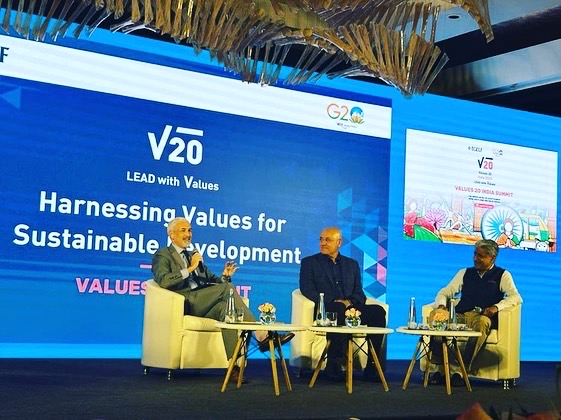
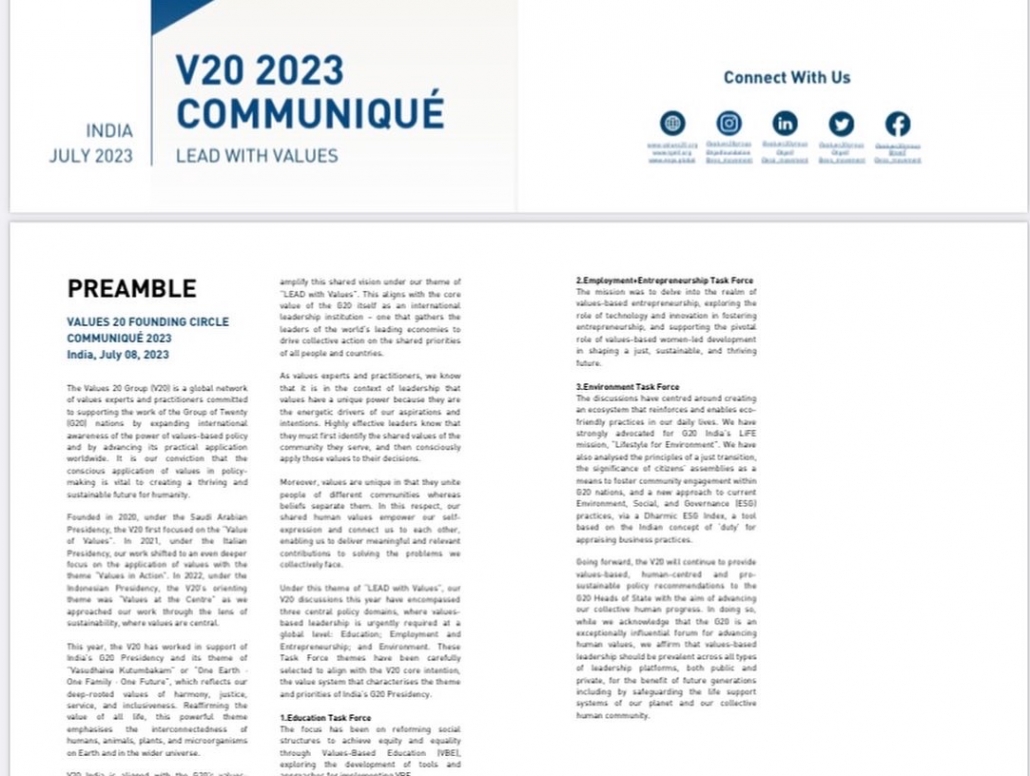
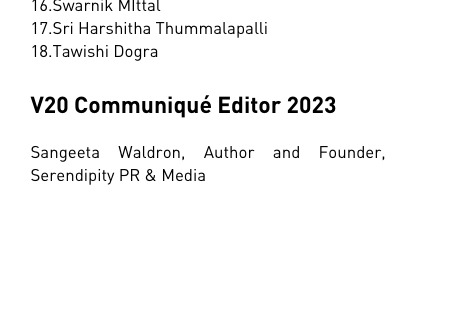 I am very proud to have been part of the V20 India and to have edited the official Communiqué of the V20 India 2023, which provides a comprehensive summary of the key recommendations of all three task forces, where climate change and sustainability had big roles throughout this report.
I am very proud to have been part of the V20 India and to have edited the official Communiqué of the V20 India 2023, which provides a comprehensive summary of the key recommendations of all three task forces, where climate change and sustainability had big roles throughout this report.
The V20 India Summit was held on July 7th and 8th and received resounding acclaim as it placed a significant emphasis on Values, encapsulating the shared objective of forging a brighter future. The V20’s unwavering commitment is to #LEADwithValues and is its driving force.
The Communiqué was recognised by the United Nations in India, acknowledging the significance of the V20 India Summit in the global arena. Mr. Shombi Sharp, UN Resident Coordinator, India, placed value on the work of the V20 India and highlighted India’s growing role as a provider of development solutions on the global stage, considering India’s presidency of the G20.
To view the full Communiqué you can see it by clicking here. Enjoy the read!

The 15th edition of the Green Events & Innovations Conference (GEI), the foremost conference for sustainable events, was a sold-out success with over 350 delegates and an agenda with heavyweight speakers, innovators, and industry leaders in the global live music, sports, and event sector. I was pleased to be part of the event and its success, which took place on 28 February at the Royal Lancaster, London.
GEI was supported by Ecotricity and this year’s edition tackled the critical sustainability issues with a gender-balanced lineup of speakers who brought their knowledge, insight, and formidable passion to the panels and conversations.
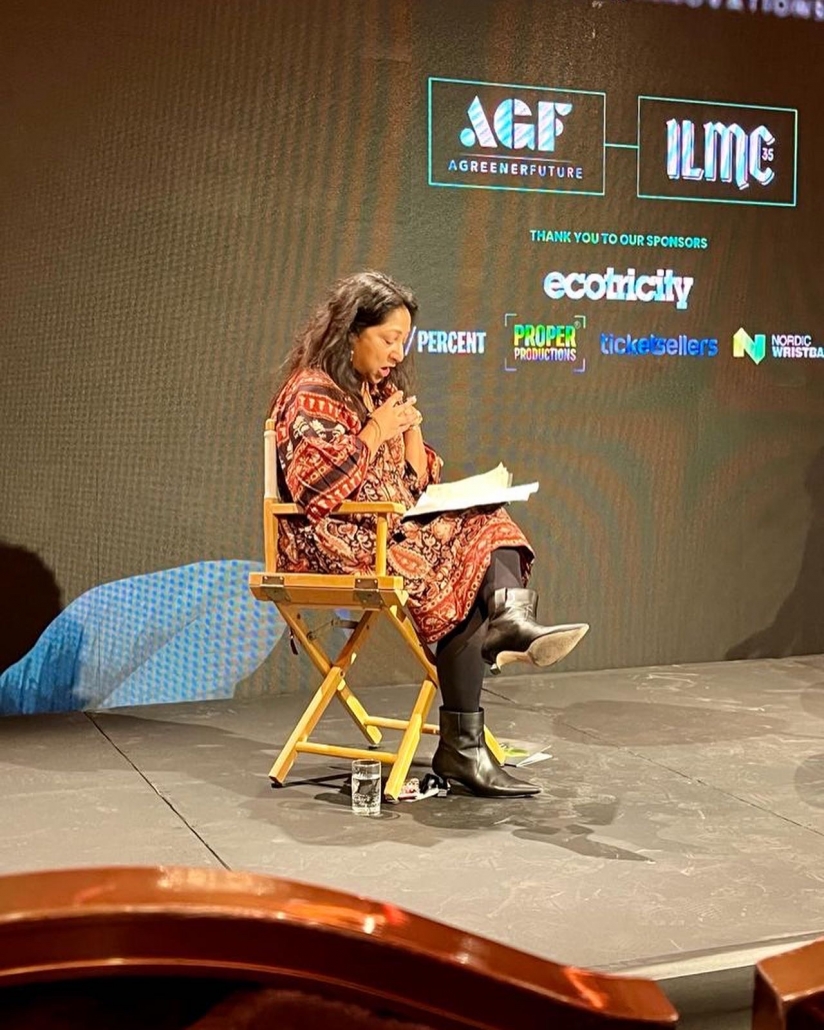
The conference kicked off with the Adapting to a New Climate Panel and Boom Festival’s Artur Mendes boldly stating that “we won’t work with brands or policymakers who aren’t aligned with our values.”
While I moderated a double-bill session, where the first part focused on the Platinum Jubilee Pageant with its CEO Rosanna Manchando, looking at the sustainability actions and takeaways from organising this huge and iconic event. The second part was with carbon removal expert, Mark Stevenson from CUR8 highlighted some key facts in carbon offsets, saying that “Any new fossil fuel exploration is a gun held to humanity’s head.”
It was a powerful day of learning, and networking, jam-packed with inspiring insight and conversation.
The day ended in a special ‘in conversation’ session with Brian Eno and Jacob Collier, who explored ‘music as a social synchroniser’ which was the keynote. An enlightening conversation that saw Brian comment that “The arts are where we develop our instinct and our conscience,” and Jacob state that “things become possible as you start doing them.” We even got to sing with Jacob Collier, which created a moment at the conference.
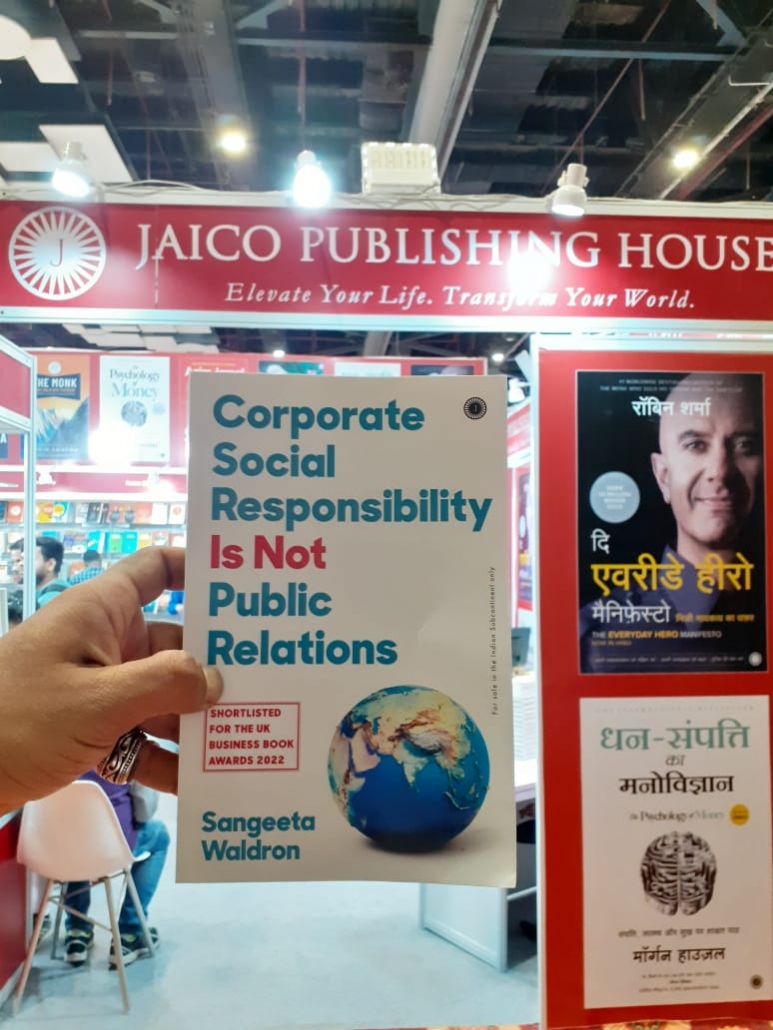
Nothing, and let me say again, nothing gives an author more joy than seeing their book being read, being with book lovers, on bookshelves, and being at book fairs. So, this photo received today, sent by my publisher was special and they have been making sure the book got all the spotlight it deserves at the World Book Fair happening in Delhi this week, which ends on 5 March.
This book has its own energy, it makes things happen and can be bought on Amazon UK and Amazon India.
This is the 31st edition of the New Delhi World Book Fair (NDWBF), which began on February 25 and has been organised by the National Book Trust (NBT) in collaboration with the India Trade Promotion Organisation (ITPO). The event has invited France as its guest of honour and will be attended by a total of 16 French authors, including Annie Ernaux, the 2022 Nobel Prize in Literature winner.
This year’s theme of the Fair is based on Azadi Ka Amrit Mahotsav, an initiative of the Government of India to celebrate and commemorate 75 years of independence and the glorious history of its people, culture, and achievements.
NDWBF was first held in 1972 after it was inaugurated by the then-President of India VV Giri. Today, it’s one of the biggest literary events in the world with a total footfall of over two million people.

I have been lucky to be invited to attend this year’s 16th Jaipur Literature Festival, India, an event that has been on my bucket list since 2012 and it did not disappoint. I would go far as saying that everyone should at least once in their lifetime, experience JLF in India. It is like Glastonbury for books, where authors are rock stars.
The Festival beautifully combines books with music, creating its own culture and vibe; and te city of Jaipur could not be more perfect for the setting for this Festival. Jaipur is the capital of the state of Rajasthan, in India. Translated from Hindi, Rajasthan means ‘the land of kings’, and Jaipur, is defined by royalty. The 18th-century Maharaja Jai Singh designed the city to meet his every desire, with royal palaces, gardens and pavilions taking up almost a quarter of its footprint. Jaipur has kept its romantic atmosphere and regal air. The entire city was painted pink in 1876 to welcome the Prince of Wales and was refreshed to celebrate the visit of Queen Elizabeth II and, later, Diana, Princess of Wales. Today, Jaipur’s prolific royal architecture is fiercely protected.

All these details matter and the Festival is colourful and vibrant. The talks are held in beautiful tents that billow in the gentle breeze, which adds to the atmosphere of romance and imagination. Each Festival morning started with Indian classical music to set the vibration of the day; and one morning there was a fusion of guitar with Indian sitar and tabla (drums) players, which was mystical and atmospheric.
The past decade has seen the Festival transform into a global literary phenomenon having hosted nearly 2000 speakers and welcomed over a million book lovers from across India and the globe. Past speakers have ranged from Nobel Laureates J.M. Coetzee, Orhan Pamuk and Muhammad Yunus, Man Booker Prize winners Ben Okri, Margaret Atwood and Paul Beatty, Sahitya Akademi winners Girish Karnad, Gulzar, Javed Akhtar, M.T. Vasudevan Nair as well as the late Mahasweta Devi and U.R. Ananthamurthy along with literary superstars including Amish Tripathi, Chimamanda Ngozi Adichie and Vikram Seth. An annual event that goes beyond literature, the Festival has also hosted Amartya Sen, Amitabh Bachchan, the late A.P.J. Abdul Kalam, His Holiness the 14th Dalai Lama, Oprah Winfrey, Stephen Fry, Thomas Piketty and former president of Afghanistan, Hamid Karzai.
The Festival brings together a diverse mix of the world’s greatest writers, thinkers, humanitarians, politicians, business leaders, sports people, and entertainers on one stage to champion the freedom to express and engage in thoughtful debate and dialogue.
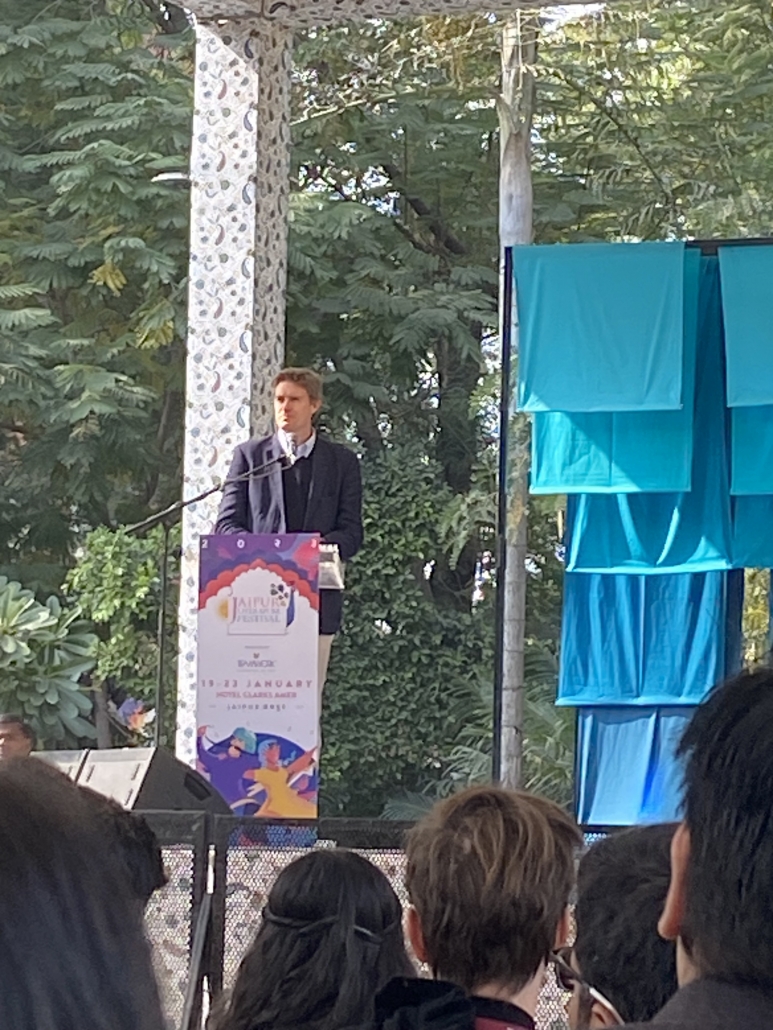 Be prepared to learn while you are at the Festival…it’s like being on a crash University course. Your brain is kept busy as you listen to authors. I learnt about the writings of the royal Indian courts and Mughals; about wellness and Ayurveda; Russia; Wedgewood poetry; the Himalayas; climate change and sustainability; cell systems; nurturing democracy and so much more. My list is endless.
Be prepared to learn while you are at the Festival…it’s like being on a crash University course. Your brain is kept busy as you listen to authors. I learnt about the writings of the royal Indian courts and Mughals; about wellness and Ayurveda; Russia; Wedgewood poetry; the Himalayas; climate change and sustainability; cell systems; nurturing democracy and so much more. My list is endless.
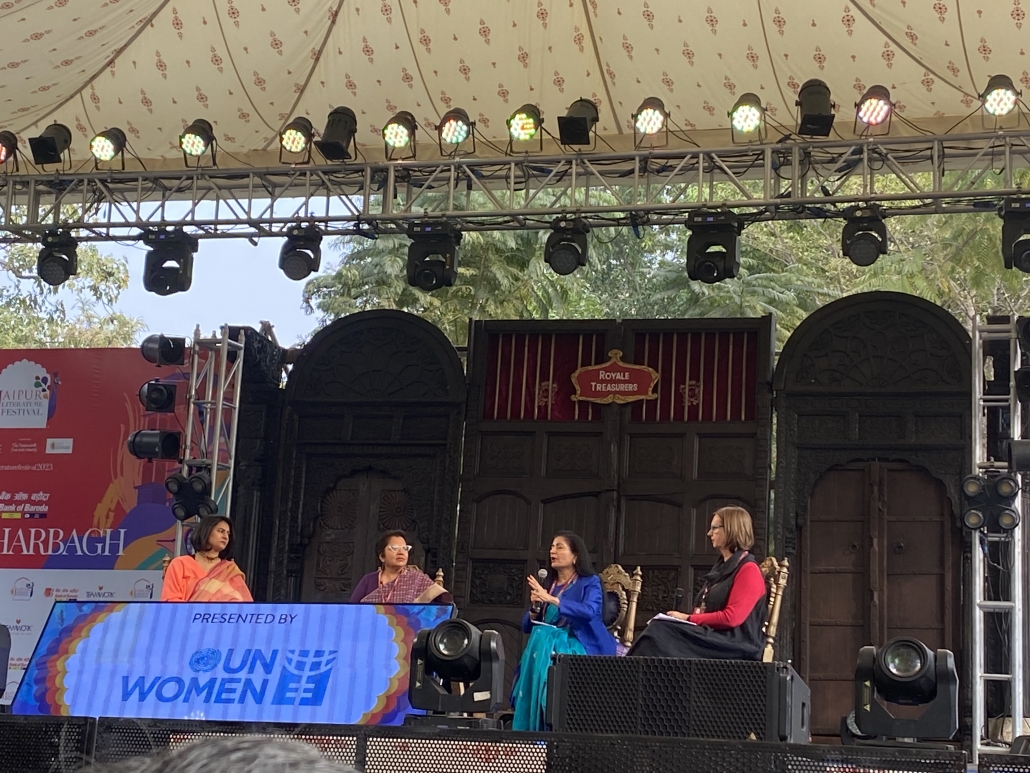
This year at JLF, the organiers had a special message about climate change and spoke about the Festival’s commitment to be more sustainable, plastic free and to reduce its carbon footprint, through innovation and better practice. While I was there this message was carried through and you could see that the organisers and volunteers were serious about their endeavours. The magic of the JLF is its serendipity, where you make new friends, find that you are staying in the same hotel as well-known international authors, sharing cabs with them…it’s a place that is a great leveller, and as I began this piece, it is an experience that everyone should have at least once their lifetime
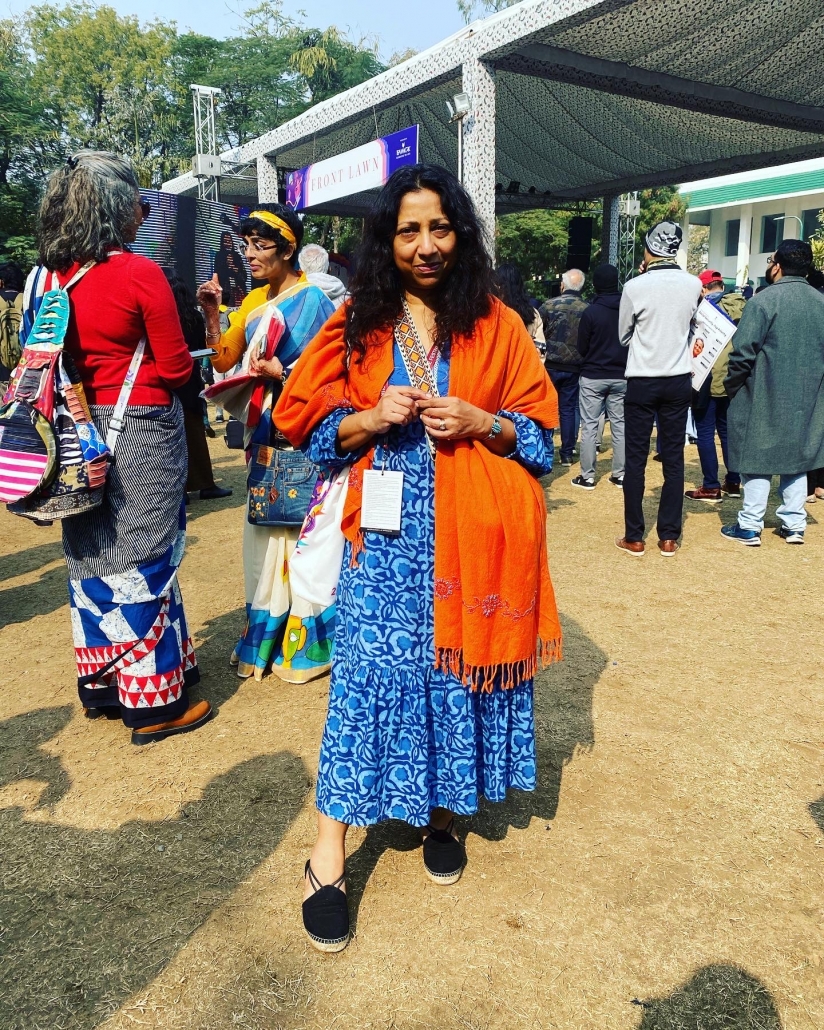
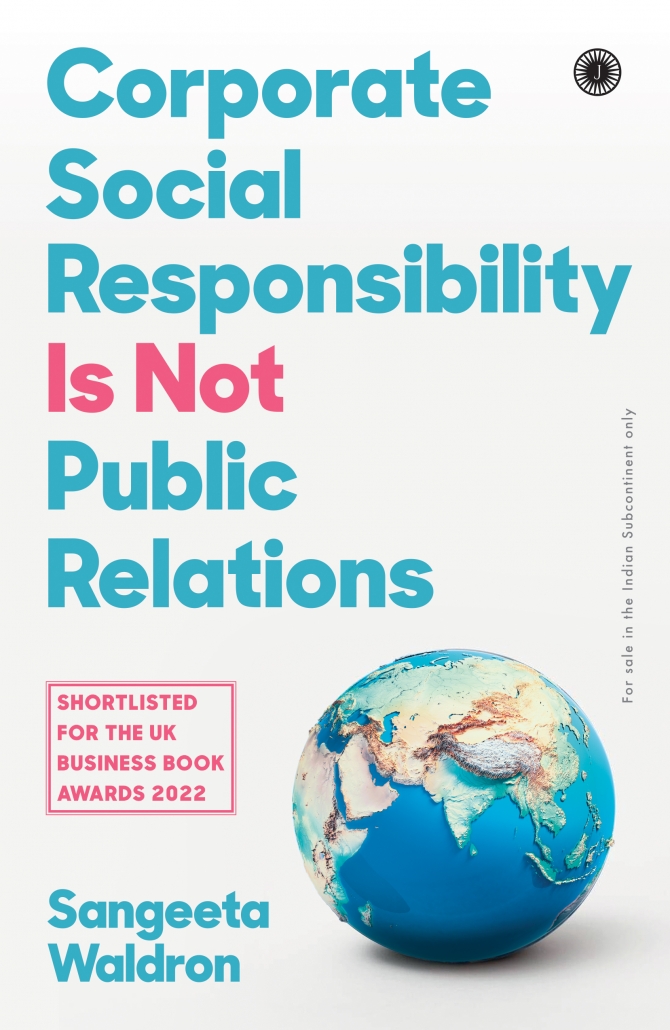
I hope everyone has had a good Christmas and now enjoying the time off before we hurl ourselves into 2023. I thought I would take this quiet moment of reflection between Christmas and the New Year to get around to updating everyone about my book, Corporate Social Responsibility Is Not Public Relations, which was published in India on 23 November 2022 by Jaico Publishing.
You will immediately notice that the book has a different cover and is one that has been designed to suit the Indian market. I just love the way on the front cover, if you notice, the line that says ‘For sale in the Indian Subcontinent only’ – that to me, makes this my book extra special. On a personal note, to have my book published and sold here, is a fairy tale come true. I spent my teenage and young adult life in India, where we had books published by Jaico on our bookshelves. Never in my wildest dreams, did I think that one day, I too would have my book published by the highly regarded publishing house.
I wanted to make this edition of the book special, and I decided to include three new interviews with business leaders that will be of interest to the market here. One interview is with an award-winning luxury British Ayurvedic wellbeing brand that has a strong Indian heritage; the other is with one’s of France’s influential ESG and CSR thought leaders and activists, who has worked in India, and the third interview is with a multi-award-winning Indo-German sustainable fashion brand that is doing great things.
I could not be prouder to have my book published in India, a country that was the first in the world to implement a national CSR law in 2014. A region that is a superpower, and has the fifth largest economy in the world, according to the International Monetary Fund. This means my book could not be timelier, because it is now vital for all national and international brands and businesses in India, to authentically commit to their CSR initiatives and build CSR into the heart of their brands and business strategies, and my book explains how to do this with purpose.
The Indian Government has started to raise consumer awareness, with its efforts toward reducing the country’s carbon footprint. Currently, India is the world’s third-largest emitter of carbon dioxide, after the US and China. According to an Associated Chambers of Commerce and Industry of India and PricewaterhouseCoopers International report, landfills are brimming with so much urban waste that by 2050, India is going to need a landfill that’s the size of its capital, New Delhi. Indian consumers aren’t ignoring these horrifying numbers anymore.
More and more consumers are becoming aware of their choices and realising that whether it is clothes that they decide to throw away, nothing ever really goes ‘away’, it all ends up in a landfill. Human activities are clearly harming the global environment and brands have no choice but to migrate to sustainable solutions and work towards building a circular economy. Information is not only to educate people about environmental issues but also to guide them on how they can make a difference every step of the way.
In October 2022, PM Modi launched Mission LiFE movement (Lifestyle for the Environment), which is an India-led global mass movement that will nudge individual and collective action to protect and preserve the environment. PM Modi said the mantra of Mission LiFE is ‘Lifestyle for Environment’ and “Connects the powers of the people for the protection of this earth and teaches them to utilize it in a better way. Mission LiFE makes the fight against climate change democratic, in which everyone can contribute within their capacity. It inspires us to do all that can be done in our everyday life to protect the environment…and that the environment can be protected by making changes in our lifestyle.”
PM Modi added that the mission emboldens the spirit of the P3 model, Pro Planet People, uniting the people of the earth as pro planet people, uniting them all in their thoughts. It functions on the basic principles of ‘Lifestyle of the planet, for the planet and by the planet’…making my book both timely and relevant to the Indian market. Jai Hind!
In light of COP27 happening this week, this photo above is striking and shows the newspaper front page stories in October 2022 with links to climate change and climate risks, from the Media and Climate Observatory (MECCO) Monthly Summaries. The work of MECCO is to monitor media coverage of themes associated with climate change and global warming, as there are no comparable monitoring services for news coverage of climate change or global warming.
MECCO reports that October media coverage of climate change or global warming in newspapers around the globe dipped five percent from September 2022 and 37 percent from September 2021 levels. MECCO’s analysis also shows that coverage in international wire services decreased 15 percent, as radio coverage rose 21 percent from September 2022. Compared to the previous month, coverage decreased in the European Union (EU) (-4%), Asia (-6%), Oceania (-6%), the Middle East (-7%) and North America (-11%).
What is apparent from this data, is that when it comes to news about this topic, media outlets often struggle to gain audience attention. The climate crisis story can seem intractable, depressing, and often difficult to understand. It is also frequently politicised, with audiences polarised on the topic.
However, the following data from MECCO is insightful, showing coverage was up from the previous month in Africa (+14%), and Latin America (+19%), revealing that interest in climate change news is highest in these regions, and this is probably because the countries here have witnessed extreme weather events linked to the climate crisis. Where Chile continues to suffer from severe drought, which has made climate change ‘easy to see’, while this year every part of the African continent was affected by extreme weather events, ranging from wildfires in Algeria to catastrophic flooding in South Africa. It may be that audiences are more interested in news about the topic when they are not so polarised and can clearly see the negative effects of extreme weather where they live.
This data clearly shows that while the climate crisis is one of the biggest challenges for humanity right now, it is not always front-page news. Audiences appear to be more interested in and pay more attention to climate change news in places where the negative effects are felt more acutely. But it is too late if audiences only pay attention once disasters have already struck!
The challenge is how newsrooms continue to cover the issue in a way that draws attention to the causes and decisions that lead to disasters, not just the disasters themselves.
Are there other ways journalists can take to make climate change stories feel more relevant? Perhaps environmental documentaries are the way forward, which have wide appeal and provide clear and engaging stories. Afterall, we are the ‘age of the visual’, with video becoming increasing popular on social media. These visual narratives help audiences connect with what is a very large and sometimes abstract story – while not necessarily being ‘political’. A good example of this is the BBC’s very successful Blue Planet series with Sir David Attenborough and according to the Sunday Times, so many Chinese viewers downloaded Blue Planet II “that it temporarily slowed down the country’s internet”.
As a public relations professional, who knows only too well about the power of storytelling, I believe it all comes down to this…there is always room for better storytelling about the climate crisis.